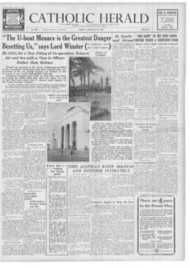Page 2, 29th January 1943
Page 2

Report an error
Noticed an error on this page?If you've noticed an error in this article please click here to report it.
Tags
Share
Related articles
Holy Innocence?
Fasting Communion A Question Of Discipline
Charities
Hymnals
Liturgy In English
HYMN TRANSLATIONS
SIR,—With reference to the letters from " Parochus " and " Holy Innocent" in your recent issues, it would he interesting to know what is regarded as unsatisfactory about the late Rev. R. G. Woodward 's (trof Woodford) translation of the carol Puer nobis nascitur?
The former correspondent seems to object to " childer.'"Ehis word may now be obsolete, but forms part of " Childcrmas," which is still applied to Holy Innocents' Day. The simplicity of the English words seems to be in keeping with the Latin text, and to me the terms child-like or childish arc attributes which are things of beauty in carol words and music generally —as well its in many other really good things.
The suggestion of " Parochus " that we joyfully re-act to Herod's crime by merry organ-playing and singing is scarcely fair, since it takes no account of thc intermediate verse which leads naturally to the climax of the carol.
I personally would say that it is a matter of taste and opinion whether the translation from The Oxford Book of Carols, referred to by " Holy Innocent," is to be preferred to that of Woodward.
With reference to the query of " Holy Innocent " regarding Hymn 158 (New Westminster Hymnal), .what is the " confusion of the title " and why is it " doubly wrong '"? The words are a translation of the Vesper hymn for All Saints, and Christe Redemptor omniunt is the first line of this as given in the Monastic as well as in the Official Vatican Antiphoncrs sccundum antiquum usum.
J. F. WALSH CLARE. 80, Toynbee Road, Wimbledon, S.W.20, Authors of Hymns SIR,—As a lover of the Westminster Hymnal, I feel I must write to remind Mr. Lloyd (and, indeed, others of your correspondents) of the old adage that " fools step in where angels fear to tread." To many it will be a surprise to find that the ascription of a hymn to this or that author, when it was given at all in hymnals of the last century, was very often misleading. Neale in A. & M. is not Neale, but Neale plus the compilers of A. & M. Take, for example, Neale's translation of the Vex/lb a Regis. His fourth verse is:
O Tree of beauty, Tree of light!
O Tree with royal purple dight! Elect on whose triumphal breast Those holy limbs should find their rest.
This verse appears in A. & M. thus: 0 Tree of glory, Tree most fair, Ordained those holy limbs to bear, How bright in purple robe it stood, The purple of a Saviour's Blood.
Neale's translations in the Westminster Hymnal have not been tampered with in any way. You will rind that the editor of the English Hymnal has used only Neale's originals and he remarks on " the efforts, so often made in the past, to improve the work of competent authors, have had the inevitable result ; the freshness and strength of the originals have heen replaced by stock phrases and commonplace sentiments."
Mr. Lloyd, then, rightly praises Neale, chooses the spurious Neale, and rejects the genuine Neale. He should compliment the compilers of the Westminster Hymnal on their wisdom.
I should imagine that Sancti senile was placed (not relegated) to the children's section because, as things are now in the Church, the only possible time when it could be sung would be at a Low Mass and Communion with hymns; this would be in the great majority ot cases a children's Mass.
However, I am certain that Mr. Lloyd and myself have much in common; doubtless, in your next issue there will he a correspondent deploring the fact that translations by non-Catholics have been placed in the hymn-book, forgetting the fact that almost all the work of Caswall, Newman, etc., was done whilst they were still Anglicans.
CHORISTER.
blog comments powered by Disqus







